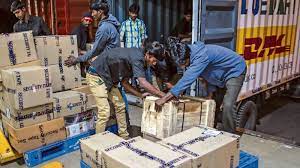
The move is part of the company’s broader effort to eliminate plastic delivery packaging.
The e-commerce firm has been researching and experimenting for years to find solutions to deliver products to customers with paper.
Its fulfilment centre in Euclid, Ohio, was the first in the US to replace plastic delivery packaging with paper packaging solutions that are curbside recyclable. “By rebuilding existing machines to use paper instead of plastic, creating durable and flexible paper packaging, improving made-to-fit technology, and transitioning from plastic air pillows to paper filler, the team enabled the Euclid fulfilment centre to transition fully to paper packaging," the company said in an October blogpost on eliminating plastic packaging.
Given the size and scope of a market like India where e-commerce adoption is rapidly increasing, the company is in active conversations with the local team to bring such technology into India.
“India is a country that we are continuing to evaluate. It’s an important marketplace for us and we’re continuing to bring innovation there. I think there’s potential for this. We’re just under evaluation with it right now," said Pat Lindner, vice president of mechatronics and sustainable packaging at Amazon.
While Lindner refused to give specific timelines on taking such technology to India, he said the move was currently under evaluation.
This work is part of a multi-year effort to convert US fulfilment centres to paper. Such new paper solutions will provide the convenience of allowing many customers to recycle at home. Like most retailers, Amazon has traditionally used a mix of plastic and paper packaging to optimize for durability, weight, and size.
However, recycling plastic packaging generally requires customers to head to a drop-off location. Its packaging engineers have been researching and experimenting for years to ensure the right solutions to deliver products to customers with paper.
Amazon has spent years developing a new machine that creates on-demand, curbside-recyclable, made-to-fit packages for products that require more protection than a non-padded bag. This machine measures an order’s dimensions and then creates a right-sized, protective package using a type of corrugate that is flexible and lighter than the typical box.
India’s e-commerce market, though nascent, is set to boom. India has gained 125 million online shoppers in the past three years, with another 80 million expected to join by 2025, according to an April report by marketing data and analytics company Kantar.
As e-commerce order volumes surge, companies are looking at solutions to lower both packaging costs and ensure usage of sustainable packaging.
“We are in discussions with our local teams, what technology is best for them. We have to consider the needs of the customers, the cost, we have to consider supplier availability, can these machines be made and can the paper supply be produced in India. If not we have to import. So we’re going through all of those evaluations now," he added.
Amazon India has already eliminated all single-use, thin-film plastic packaging originating from Amazon’s India fulfilment network since 2020, and introduced packing paper and paper cushions in its fulfilment network to replace plastic air pillows and bubble wraps. Additionally, as part of its packaging reduction programme announced in 2019, the company enables orders in India to be shipped in their original packaging or with reduced packaging.
However, it is stepping up efforts globally to move away from plastic packaging as well as reduce its overall packaging material usage.
“We’re looking at not only India, but we also have similar types of machines in Japan, we are expanding in Australia as well. So India right now I would consider that as the next place that we are looking at prototyping but we don’t have plans to scale right now. What we’re really trying to do is learn from this technology and get as much knowledge from customer feedback and then really understand the local market needs and decide whether this is a solution," he said.
In 2022 alone, Amazon cut single-use plastic delivery packaging by 11.6% across global operations by expanding paper-based packaging.






